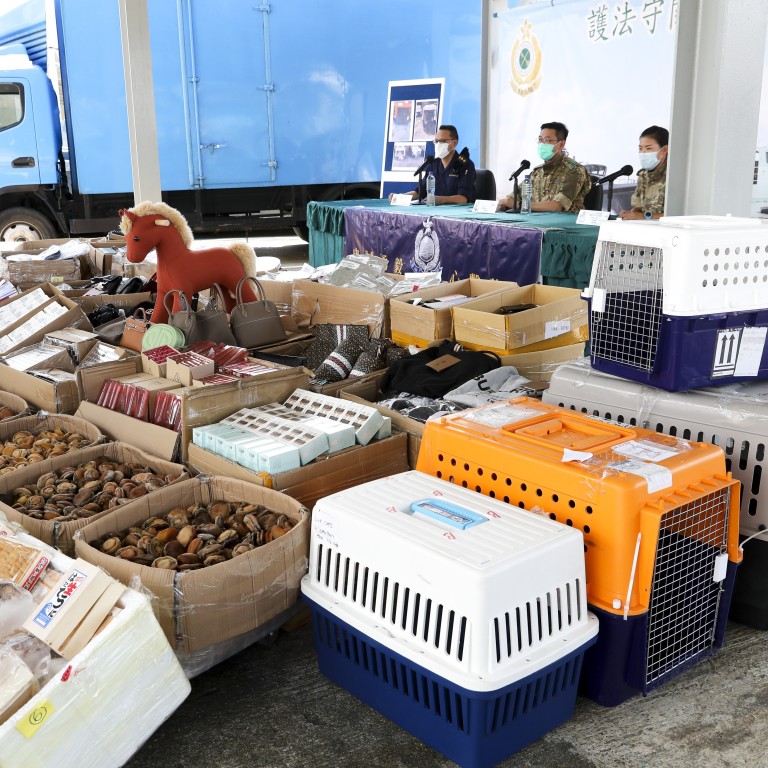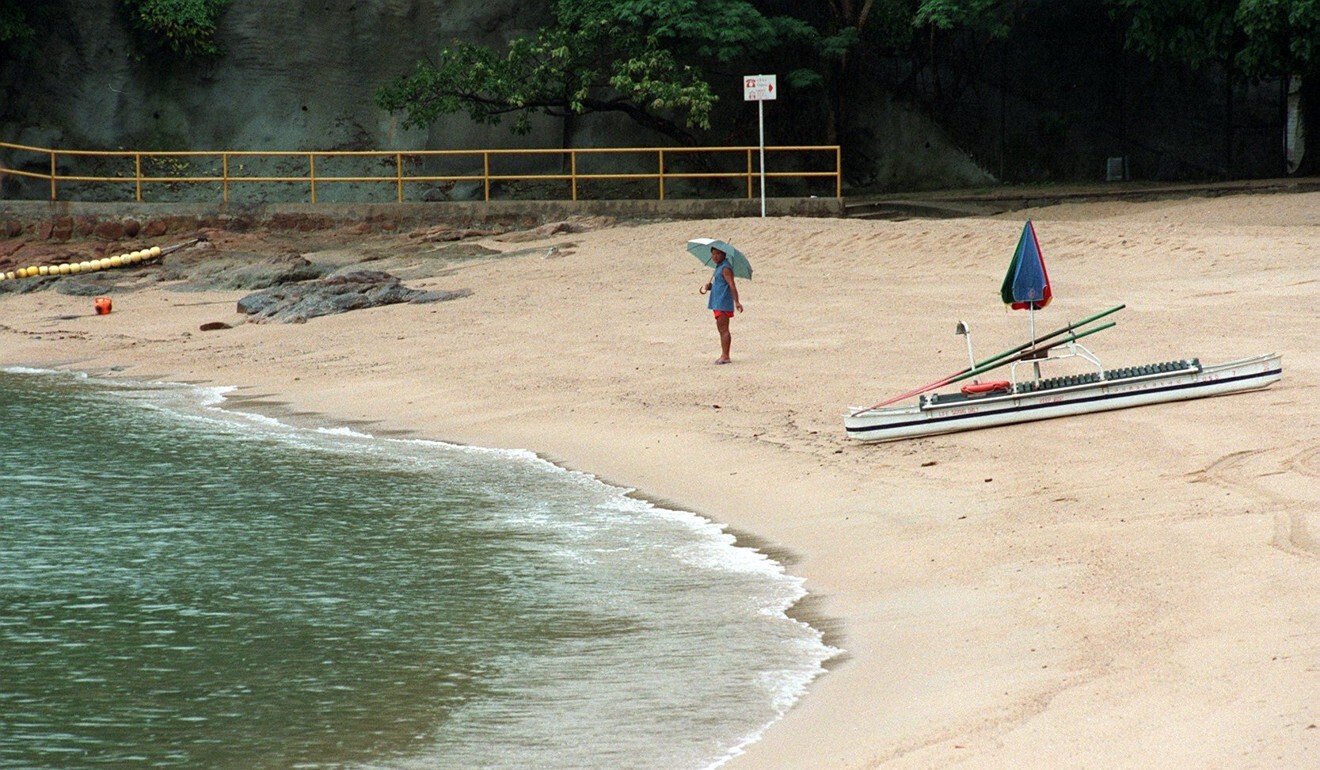
Fear grips mainland Chinese pet owners over gruesome find involving 15 dead animals on Hong Kong shores, following anti-smuggling chase
- Some of the dogs and cats were still in cages, with case linked to smugglers throwing cargo overboard while being pursued by police
- It’s believed Hong Kong used as a transit point for illegal service thought to be set up for pet owners who have moved back to mainland China from abroad
Pet owners in mainland China hoping to reunite with their furry companions being shipped across the border from Hong Kong found themselves gripped by fear that the animals could have been victims of drowning by smugglers trying to destroy evidence.
Hong Kong police received numerous calls this week over the whereabouts of pets following an earlier anti-smuggling operation linked to the gruesome find of 15 carcasses of cats and dogs, some still in cages, on the city’s beaches.
A police source said the animals might have been thrown overboard by smugglers while they were being pursued.
On Thursday, 12 dead cats in two cages were discovered on Lamma Power Station Beach at 7.30am, with three dog carcasses found on St Stephen’s Beach in Stanley the day before.
Another source said the two cases could be linked to a joint anti-smuggling operation mounted by police and customs officers off Mui Wo on Lantau Island last Friday night.

In that operation, authorities seized 12 other dogs along with HK$37 million worth of goods, and officers are investigating if the pets were being taken to mainland China to be reunited with their owners, after being shipped to Hong Kong from overseas.
More than 20 dog owners, or their helpers, have contacted authorities and groups involved. Their pets were reportedly sent to Hong Kong from countries including the United States, Canada, Britain, and Australia. Some of the owners were believed to be mainland Chinese who had worked or studied abroad but had since returned, and had engaged services to have their pets sent back to them.
“We believe the cages carrying the animals were among some cargo that were thrown into the sea from one of two speedboats used by smugglers to avoid being arrested during the high-speed sea pursuit with law enforcers,” the source said.
He said the 15 dogs and cats were thought to have drowned before the cages washed ashore.
During the operation, one of the speedboats managed to escape Hong Kong waters, heading toward the mainland. Officers intercepted the other vessel and arrested two mainland men on board.
On the boat, officers found 12 pet dogs, along with HK$37 million of goods that included abalone, electronic goods, red wine and cosmetic products. The dogs, including labradors and poodles, had identification microchips implanted.
Authorities smash syndicate that smuggles workers from Zhuhai into Hong Kong
Among the troubled callers was Hongkonger Ellie Chan, a friend of a pet owner whom she only named as “Dong”, who had finished his studies in Sydney and returned to his home in Hangzhou in Zhejiang province, where he was eagerly expecting to meet his three-year-old Maltese poodle called Kris.
Chan said her friend had paid A$500 as deposit and another A$2,950 (HK$16,500) to a WeChat user and cat seller in Sydney. Dong was promised that his dog would be shipped to Hong Kong and be put up in a pet hotel for a few days while undergoing customs clearance, before being sent to the mainland.
He was also promised that staff members would accompany his dog throughout the journey, and that the operation was a legal one.
The company also said an agent in Hong Kong dubbed “DC International Animals Transport” would take care of Dong’s dog in the city, according to Chan. An online search by the Post found no company by this name.
Chan, who said they were told the dog arrived in Hong Kong on Aug 19, added: “A video of the dog was sent daily as updates to the owner, but we don’t know when these were taken.
“The agent in Hong Kong claimed that the dog was picked up on the morning of August 23, but they became uncontactable after that.”
After being approached for help by her friend on Tuesday, Chan, a student in London who is back in the city because of the Covid-19 pandemic, called up the pet hotel, which claimed the dog was indeed taken out on August 23.
She learned from media reports about the case in Mui Wo and saw in newspaper photographs a dog that fit the appearance of her friend’s pet. She called the Society for the Prevention of Cruelty to Animals (SPCA) and police.
After an initial scare in which a microchip check showed the dog in question was not among the 12 animals seized alive, police later confirmed the pet was among the batch.
“It’s obvious that the pet hotel was lying. I’m speculating it was doing something illegal. How could the dog be involved in the case on August 21?” Chan said.
“Both police and the SPCA told me there had been a large number of such missing dog reports recently,” she added.
Amid worries by Chan and Dong that their beloved animal could not return home as it was now involved in a criminal case, the latter intended to come to Hong Kong to be reunited with his pet.
It is possible that their pets were shipped into Hong Kong from overseas before being smuggled into the mainland by sea
The police source said they were still investigating whether the 12 dead cats found on Thursday “were also microchipped and registered in Hong Kong”.
He said he did not rule out the possibility the pets were being smuggled to be reunited with their owners, but the animals could also have been intended for sale on the mainland.
The source said officers were trying to track down the dogs’ owners.
“Some mainlanders have returned from overseas, in the wake of the coronavirus pandemic,” the source said. “But their pets could not be shipped back to the mainland because of stringent import restrictions amid the pandemic.
“It is possible that their pets were shipped into Hong Kong from overseas before being smuggled into the mainland by sea.”
Meanwhile, local animal rescue group Villa Kunterbunt Lantau said it also received two calls for help from mainland Chinese pet owners.
A source familiar with animal-smuggling activities estimated that operators could make about HK$3,000 to HK$5,000 for each pet handled.
He said the case could be related to the decimation of air travel worldwide, especially to and from China, prompting illegal animal transporters to make use of Hong Kong as a more connected transit point.
In Hong Kong, cruelty to animals carries a maximum penalty of three years in jail and a fine of up to HK$200,000.



